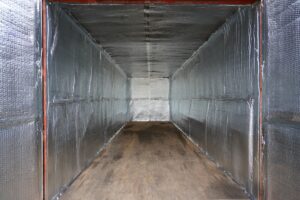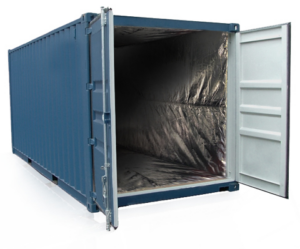Temperature fluctuations and moisture pose significant risks to goods stored in shipping containers. Proper shipping container insulation stands as the primary defence against these environmental challenges, protecting valuable inventory from damage and deterioration. The right insulation solution makes the difference between preserved products and costly losses.
Modern insulation technologies offer various options for protecting stored goods, with foil insulation emerging as the superior choice for thermal performance and moisture control. This comprehensive guide examines temperature regulation methods, condensation control solutions, and the specific advantages of different insulation types. Readers will discover how to select and implement the most effective insulation system for their storage needs while maximising their investment in container protection.

The Importance of Temperature Control in Storage
Protecting goods from extreme temperatures
A stable internal environment is crucial for preserving various types of cargo:
- Pharmaceutical products and medical supplies
- Electronics and technical equipment
- Food and perishable goods
- Chemicals and industrial materials
The insulation layer acts as a thermal barrier, preventing heat transfer between the container’s interior and external environment. Foil insulation particularly excels at this task, demonstrating superior performance by slowing temperature increases to less than 1 degree Celsius per hour, even in ambient temperatures exceeding 48 degrees Celsius.

Preventing condensation and moisture damage
“Container rain” occurs when warm, moist air inside the container reaches its dew point, resulting in water droplets forming on the ceiling and walls. This phenomenon can lead to several serious issues:
The consequences of unchecked condensation include corrosion, warping, and deterioration of packaging materials. Proper insulation, particularly foil-based solutions, creates a vapour barrier that significantly reduces the likelihood of condensation formation by maintaining consistent temperatures.
Maintaining product quality and shelf life
Temperature stability directly impacts product longevity and quality maintenance. By creating an ideal storage environment, insulated containers effectively slow down natural degradation processes. This temperature control is particularly vital for businesses handling temperature-sensitive products, as it helps comply with strict regulatory requirements while minimising product loss and waste.
The economic implications of proper temperature control are significant. Insulated storage solutions contribute to energy efficiency by reducing the need for continuous temperature regulation. This dual benefit of product protection and energy conservation makes temperature control an essential consideration for any business utilising shipping containers for storage.
Types of Insulation for Shipping Containers
When selecting insulation for shipping containers, understanding the available options and their specific advantages becomes crucial for making an informed decision. Modern insulation technologies offer varying degrees of effectiveness, with some solutions proving more advantageous than others.
Foil container insulation
Reflective foil insulation stands out as a superior choice for shipping container protection. This innovative solution effectively reflects radiant heat away from the container’s interior, significantly reducing the need for additional cooling measures. The system comes with several distinct advantages:
- Creates an effective vapour barrier preventing condensation
- Offers simple installation with adhesive backing
- Provides excellent durability and tear resistance
- Delivers substantial energy savings through superior heat reflection
Spray foam insulation
Spray foam represents another common insulation option, utilising expanding foam technology to create a seamless barrier. While it offers certain benefits, it comes with notable limitations.
The closed-cell variety provides approximately R-6 per inch of insulation value. However, spray foam installation requires specialised equipment and expertise, making it a more expensive option.
Comparison of insulation options
When evaluating insulation solutions, foil insulation demonstrates clear advantages over spray foam in several key areas:
Cost-Efficiency: Foil insulation provides a more economical solution, with readily available materials and straightforward installation processes. In contrast, spray foam requires professional installation and specialised equipment, significantly increasing overall costs.
Installation Process: Foil insulation features pre-measured rolls with adhesive backing, allowing for simple DIY installation. The process requires minimal training and standard tools, unlike spray foam which demands professional expertise and safety equipment.
Environmental Impact: Foil insulation often incorporates recycled materials and can be recycled at the end of its life cycle. Conversely, spray foam may contain chemicals like HFCs that could potentially impact the environment negatively.
Performance: While both options provide effective insulation, foil insulation excels in moisture control and creates a more reliable vapour barrier. The material’s reflective properties make it particularly effective in managing temperature fluctuations, especially in warmer climates.
Benefits of Properly Insulated Storage Containers
Properly insulated shipping containers deliver substantial benefits that extend far beyond basic temperature control. Modern insulation solutions, particularly foil-based systems, have revolutionised how businesses approach storage and protection of valuable goods.
Energy efficiency and cost savings
Implementing proper container insulation yields remarkable cost benefits through enhanced energy efficiency. Studies show that foil insulation can reduce heat gain and loss by more than 80% while decreasing operational costs by approximately 20% compared to traditional solutions. This significant reduction in energy consumption makes foil insulation particularly attractive for businesses seeking to optimise their storage expenses.
Enhanced protection for sensitive goods
The protective capabilities of insulated containers extend to a wide range of sensitive items. Advanced foil insulation systems create an optimal storage environment by:
- Maintaining consistent internal temperatures
- Preventing moisture accumulation and condensation
- Protecting against UV radiation damage
- Reducing sound transmission for noise-sensitive storage
Research demonstrates that well-insulated containers can achieve up to 40% reduction in overall energy consumption while maintaining ideal storage conditions. This level of protection proves especially valuable for businesses storing temperature-sensitive products such as pharmaceuticals, electronics, and perishable goods.
Versatility for various storage needs
Modern insulated containers offer unprecedented flexibility in storage applications. Foil insulation’s adaptability makes it suitable for diverse storage requirements, from temporary storage during house moves to long-term commercial applications. The material’s durability ensures that containers maintain their protective properties for decades, providing a long-term solution for various storage needs.
The economic advantages become particularly evident when considering long-term operational costs. With a service life exceeding 30 years and minimal maintenance requirements, foil-insulated containers represent a sound investment in storage infrastructure. This combination of longevity and performance makes them an ideal choice for businesses seeking reliable, cost-effective storage solutions.
How to Choose the Right Insulation for Your Container
Selecting the right insulation solution for a shipping container requires careful consideration of multiple factors to ensure optimal performance and value. A systematic approach to this decision-making process helps businesses maximise their investment while achieving desired protection levels.
Assessing your storage requirements
The selection process begins with a thorough evaluation of specific storage needs. Storage requirements vary significantly based on:
- Content sensitivity to temperature fluctuations
- Duration of storage periods
- Required temperature range maintenance
- Moisture protection requirements
- Space utilisation needs
Considering climate and location
Climate conditions play a crucial role in determining the most effective insulation solution. In regions with extreme temperatures, foil container insulation demonstrates superior performance by maintaining stable internal temperatures. This solution proves particularly effective in both hot and cold climates, with thermal properties that can reduce energy consumption by up to 50% compared to alternative options.
Evaluating insulation performance and cost
When comparing insulation options, foil-based solutions offer compelling advantages in both performance and cost-effectiveness. While spray foam insulation costs can reach up to £50 per square metre for living accommodation standards, foil insulation provides a more economical alternative without compromising effectiveness.
The performance metrics clearly favour foil insulation systems:
- Creates an effective vapour control layer for superior condensation prevention
- Maintains consistent thermal performance equivalent to 55mm of polystyrene while being only 4mm thick
- Offers straightforward installation with adhesive backing and vapour control tape
For businesses seeking optimal temperature control, foil insulation emerges as the superior choice. Its combination of high thermal resistance, moisture control capabilities, and cost-effectiveness makes it particularly suitable for commercial storage applications. The material’s ability to maintain stable temperatures while preventing condensation ensures that protected goods remain in optimal condition throughout their storage period
Conclusion
Shipping container insulation stands as a critical investment for businesses seeking reliable storage solutions. Foil insulation emerges as the clear market leader, delivering superior temperature control while significantly reducing energy costs compared to spray foam alternatives. Research demonstrates that foil-based solutions maintain optimal storage conditions with minimal thickness, creating an effective vapour barrier that protects valuable goods from temperature fluctuations and moisture damage.
Smart business owners recognise the long-term advantages of foil insulation systems, which provide decades of reliable performance with minimal maintenance requirements. These systems offer unmatched protection for sensitive goods while delivering substantial energy savings throughout their operational lifetime. Companies looking to maximise their storage efficiency and protect their valuable inventory should consider foil insulation as their primary choice, ensuring both immediate and lasting benefits for their storage operations.








